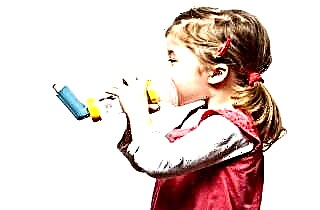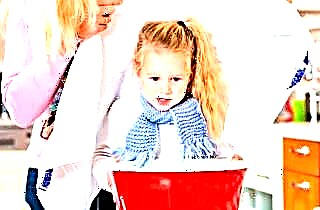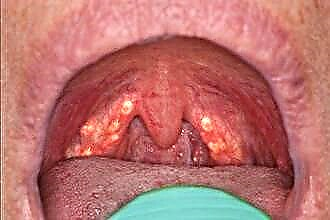The nasal mucosa was swollen at least once in every child. Parents who have already faced this trouble know what to do in such a situation. But for those who do not yet have this experience, it will be very useful to find out which remedies are most effective to relieve swelling of the nasal mucosa in a child.
How to recognize swelling of the nose
 So where does this swelling come from? It appears when excess fluid accumulates in the tissues of the nasal cavity. As a result, the baby experiences severe discomfort due to congestion and the inability to breathe normally. If this condition is a symptom of a disease, then it may be accompanied by drowsiness and fatigue.
So where does this swelling come from? It appears when excess fluid accumulates in the tissues of the nasal cavity. As a result, the baby experiences severe discomfort due to congestion and the inability to breathe normally. If this condition is a symptom of a disease, then it may be accompanied by drowsiness and fatigue.
In early childhood, swelling of the nasal mucosa can cause a number of dangerous complications and even provoke respiratory arrest. Therefore, as soon as you suspect a child has problems with the nose, you should immediately consult a doctor. After all, the sooner the disease is diagnosed, the faster and more efficiently the edema can be eliminated.
You can see that the nasal mucosa is swollen if you look into the nasal passages. It usually turns red and swells. However, parents know that it is not always possible to examine the baby's mucous membrane well. Therefore, you should pay attention to symptoms that may indicate nasal swelling.
As a rule, it is accompanied by:
- difficulty breathing;
- feeling of congestion;
- high temperature;
- headache;
- colorless snot;
- loss of smell;
- burning and dry feeling in the nose.
If the swelling is triggered by an infection, the child may become fatigued and weak. When the nose is swollen for a long time, there is a risk of complications in the form of purulent inflammation. Its characteristic symptom is periodic discharge of offensive yellow or green mucus from the nasal passages.
If the swelling is of an allergic origin, children sneeze regularly. Such puffiness develops almost instantly - after contact with the allergen has occurred. The snot can be completely transparent. Allergies are additionally indicated by itchy skin and unpleasant sore throat. In many cases, allergic edema, along with the accompanying symptoms, goes away rather quickly - as soon as the irritant is removed.
To summarize: the nasal mucosa can swell due to infection, an allergic reaction or injury. When the cause of the puffiness is clearly established, you can begin to eliminate it.
What medications are permissible to use
For many parents, the question of how to relieve swelling of the nasal mucosa in their child is updated periodically. The fact is that today there are many different treatment options. And not only with pharmaceutical medicines, but also with folk remedies.
 The pediatrician will tell you in more detail what to do. He will give the child an accurate diagnosis, because you need to know what we are going to treat. Among the huge arsenal of medications, doctors most often prescribe:
The pediatrician will tell you in more detail what to do. He will give the child an accurate diagnosis, because you need to know what we are going to treat. Among the huge arsenal of medications, doctors most often prescribe:
- Drops for vasoconstriction. The range of drugs, the action of which is aimed at narrowing the blood vessels, is very wide. However, when purchasing them, it must be remembered that the elimination of edema with their help is associated with an increase in blood pressure. Therefore, it is permissible to apply no longer than 5-7 days. If this period is exceeded, the risk of hypertension in the child increases. Of course, before giving your baby a vasoconstrictor drug, you should carefully study the instructions attached to it. The most important point in it after the dosage is the list of contraindications and possible side effects.
- Antiseptics. If the nasal mucosa is swollen due to an infectious or respiratory disease, it is advisable to use an antiseptic medication to relieve swelling. The optimal form of release of such funds for children is drops. Getting directly on the affected mucosa, they reduce edema and, accordingly, accelerate recovery.
- Antibiotics If the doctor finds out that the child's nasal mucosa is swollen due to an infectious or viral disease, he may prescribe antibiotics. These drugs are characterized by powerful effects on the body. However, the list of possible side effects is quite impressive. Self-medication with antibiotics is unacceptable. Their use should be prescribed and monitored exclusively by the attending physician.
- Washing. In order to thoroughly rinse the baby's nose, you can use the products purchased at the pharmacy, made on the basis of purified sea water, or ordinary saline solution. The procedure must be carried out clearly according to the instructions. Despite the fact that the composition of the products for washing is considered harmless, their prolonged or too frequent use can harm the child. Everything should be done in moderation.
- Inhalation. If these procedures are performed using a special device (nebulizer), you can quickly get rid of the swelling of the nasal mucosa. In addition, inhalations have a complex effect on the upper and lower respiratory tract. This is extremely important if your baby is diagnosed with a respiratory illness. For the procedures, you can use both healing essential oils and ordinary mineral water, as well as special inhalation liquids purchased at the pharmacy.

- Ointments. To relieve the swelling of the child's nose, doctors recommend using herbal ointments. When using them, it is extremely important not to forget that the skin and nasal mucosa of a child is much more sensitive than that of an adult. Therefore, be extremely careful.
- Surgical intervention. They resort to it in rare cases - when medications are powerless. An exceptionally operative way can be dealt with, for example, with adenoids. Also, the operation is recommended if the edema provoked a pathological neoplasm.
Obviously, there are plenty of ways to successfully treat swelling in a child's nose with medication today. The main thing is to observe the dosage and consult a doctor.
Folk recipes
The main advantage of “grandma's” recipes is that many of them are completely safe. This means that most traditional medicines are suitable for children. Of course, in an age-appropriate dosage.
So, how to remove edema from folk remedies:
- Iodine solution. It is necessary to rinse the baby's nose with the prepared solution. This method is recommended if the swelling appears due to the development of a bacterial infection. To prepare it, you need to take a glass of boiled water at room temperature and add 1 or 2 drops of iodine to it. When washing your baby's nose with this tool, be careful not to get it down the throat. It is highly undesirable to swallow an iodine solution.
 Inhalation. If you don't have a nebulizer, that's okay. You can do without it. It is good to do inhalations with healing essential oils, which should be dripped into boiling water. For one time, 3-4 drops of essential oil of a coniferous tree are enough. You can use different ones and alternate them. Breathe over a container of boiling water very carefully so as not to get burned. This procedure must be done 3-4 times a day.
Inhalation. If you don't have a nebulizer, that's okay. You can do without it. It is good to do inhalations with healing essential oils, which should be dripped into boiling water. For one time, 3-4 drops of essential oil of a coniferous tree are enough. You can use different ones and alternate them. Breathe over a container of boiling water very carefully so as not to get burned. This procedure must be done 3-4 times a day.- Onion juice. To make a natural medicine from onions, you need to grate or puree one large onion with a blender.Then add the obtained onion gruel (3 teaspoons) to a glass of pre-boiled and cooled to room temperature water. Mix well. Optionally, add a teaspoon of liquid honey. Leave the drug to infuse for about 40-50 minutes. After that, you need to instill this remedy for the child - 5 drops should fall on each nostril.
- Aloe juice. To prepare this product, you need to cut off 3-4 of the largest and fleshy leaves of aloe (as a rule, these are the lower leaves). Rinse them well and grind with a meat grinder or blender. Squeeze the resulting mass through a piece of gauze. The squeezed juice must be instilled in the baby, 3 drops in each nasal passage. This should be done 4-5 times a day.
The given recipes of drugs are one of the most effective and popular. In general, traditional medicine has a fairly wide range of tools that can be used to successfully remove the swelling of the nose in a child.
Post factum
 Despite the fact that pharmacies sell a huge number of drugs to relieve swelling of the nasal mucosa, and thematic brochures in bookstores and Internet sites are replete with recipes for traditional medicine, the child should be treated under medical supervision. Indeed, for infants, swelling of the nose is a real danger to life - they can simply suffocate in a dream or during feeding.
Despite the fact that pharmacies sell a huge number of drugs to relieve swelling of the nasal mucosa, and thematic brochures in bookstores and Internet sites are replete with recipes for traditional medicine, the child should be treated under medical supervision. Indeed, for infants, swelling of the nose is a real danger to life - they can simply suffocate in a dream or during feeding.
Important: it is better not to use vasoconstrictor drugs with a short-term effect. After some improvement, the mucous membrane will swell even more.
It is recommended to prefer those drops that have a long lasting effect. They will need to be used infrequently, which means that addiction will not develop. Also, it will not be superfluous to remind you of the need to carefully monitor the dosage.


 Inhalation. If you don't have a nebulizer, that's okay. You can do without it. It is good to do inhalations with healing essential oils, which should be dripped into boiling water. For one time, 3-4 drops of essential oil of a coniferous tree are enough. You can use different ones and alternate them. Breathe over a container of boiling water very carefully so as not to get burned. This procedure must be done 3-4 times a day.
Inhalation. If you don't have a nebulizer, that's okay. You can do without it. It is good to do inhalations with healing essential oils, which should be dripped into boiling water. For one time, 3-4 drops of essential oil of a coniferous tree are enough. You can use different ones and alternate them. Breathe over a container of boiling water very carefully so as not to get burned. This procedure must be done 3-4 times a day.

